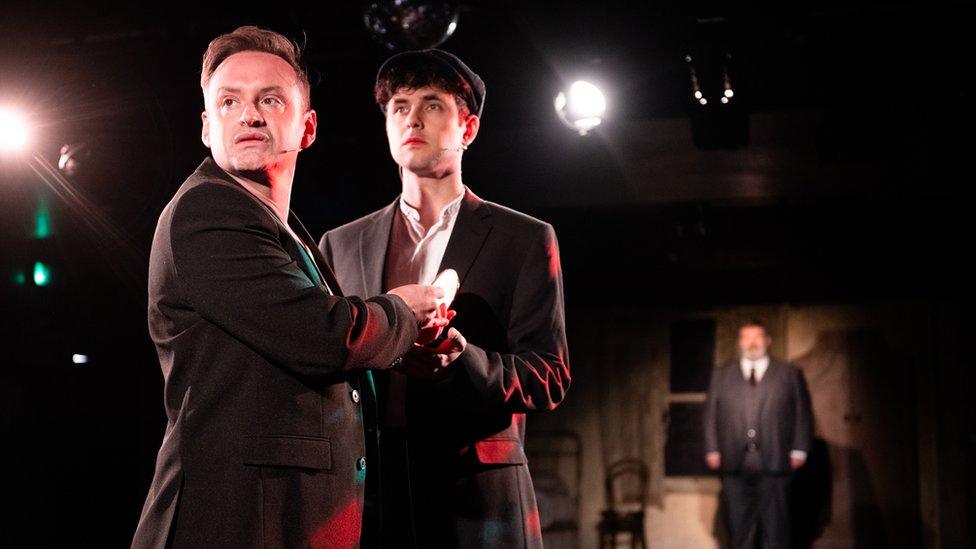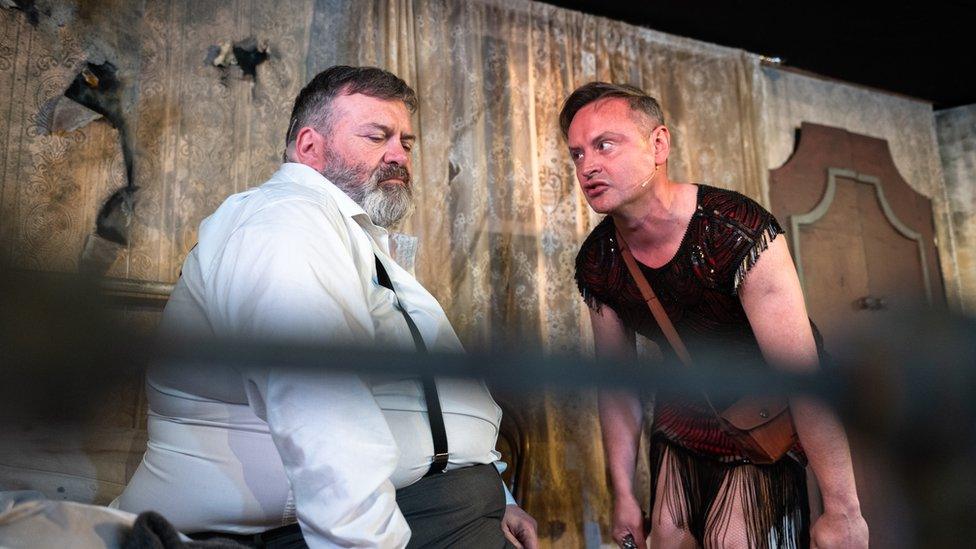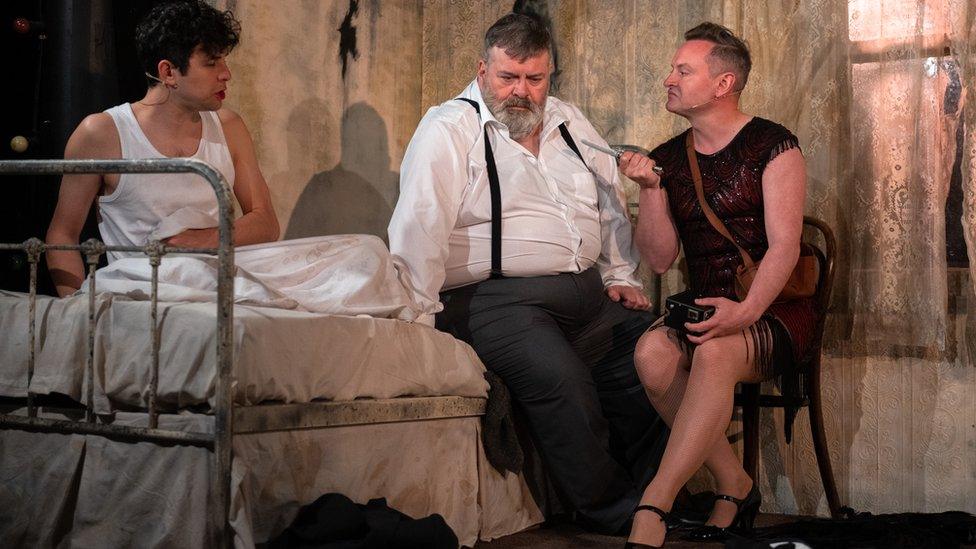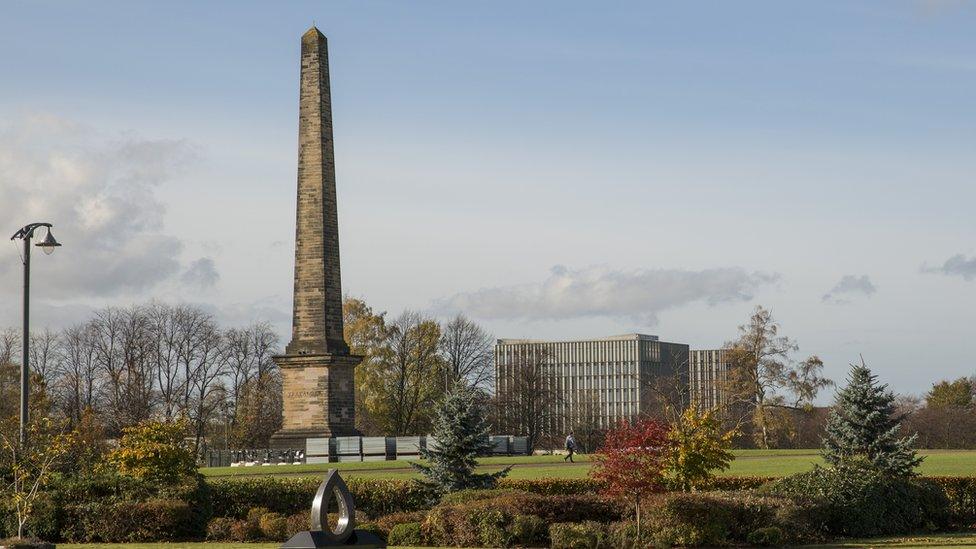'Peaky Blinders-in-drag' inspire new musical
- Published

Tom Urie, Darren Brownlie and Dylan Wood are starring in Meet Me At The Knob
A criminal gang who dressed in women's clothing and used female pseudonyms during their reign of terror in 1920s Glasgow has inspired a new musical.
The show is loosely based on The Whitehats, a group who took the names of variety performers and committed theft, fraud and prostitution.
Many of them were gay while others found they could not get legitimate work because of their criminal records.
Writer Johnny McKnight described them as Peaky Blinders led by a gay showman.
Meet Me At The Knob is being staged at Glasgow's Oran Mor as part of the A Play, A Pie and A Pint series, and stars former River City stars Tom Urie and Darren Brownlie, alongside Dylan Wood.
In the musical, which is laced with dark humour, a male prostitute brings his client - a high court judge - back to his hotel.
However, unknown to the judge, the gang leader is hidden in the wardrobe armed with a camera to take compromising images for bribery purposes.

Taking inspiration from the Whitehats crimes of bribery and prostitution, the play features a range of gay characters
McKnight, an award-winning writer and director who has also worked on River City, wrote the musical after coming across the story of The Whitehats, external by chance.
He said it inspired him to look at a period of LGBT history in Scotland which is often overlooked.
"I just thought it would be very interesting to have a Peaky Blinders but actually the leader of the gang is gay and a showman," he said.
He enlisted Glasgow-based musicians Novasound to create a modern take on 1920s music.
It was important that he could use the musical to steer clear of stereotypes and show a range of gay characters - especially as it is being staged during Pride month.

McKnight said it was his first time writing a play with only gay characters
"It's really nice to be able to represent a community that you're part of as well in complexity because there is multiple gay characters in it which is important because one person does not represent an entire sexuality," he said.
"You can have an evil character as well as someone who's completely open and flamboyant because for so long a representation of a minority group is often one person and one person, one personality can't speak for an entire community."
Gangleader Liz -played by Brownlie - is based on Dundee-born William Patton, a petty criminal who became ringleader of The Whitehats when he moved to Glasgow.
On one occasion, Patton and an associate were jailed after being caught collecting money for a fake charity while dressed as a Spanish cabaret girl and a fortune teller.
The title of the show refers to the Nelson Monument at Glasgow Green, which was colloquially named "the knob" and used as a secluded spot to rendezvous.

A slang term for Nelson's Monument inspired the title of the musical
Police would often hide in the bushes around the monument in a bid to catch offenders.
For straight couples, that meant a telling off before being sent on their way but gay couples faced arrest and a criminal record.
Homosexuality among men was illegal in Scotland until 1980.
As well as the stigma faced by the LGBT community, McKnight was also keen to explore how poverty affected those with a criminal record.
"One of the characters isn't gay but has a criminal record and at that time men with criminal records couldn't get other jobs," he said.
"In the 20s you had the great depression and poverty and so people were having to turn tricks as a way to make money but of course the shame of having to do that….they weren't telling their wives and their children that it was the only way they could make money."
'Desperate attempt to survive'
Jeff Meek, a University of Glasgow lecturer who has written a book, external about the real Whitehats gang, said their story reflected the challenges faced by many LGBT Scots at the time.
"Being blackmailed for alleged homosexual acts was a ubiquitous threat throughout the period, and while the stylishly-dressed Whitehat might offer some intimacy, that also presented an opportunity for extortion, especially if the victim was perceived to be well-off, Dr Meek said.
"My research has shown that while William Patton/Paton's intentions were to build a profitable criminal empire, for some of the Whitehats, queer sex work, often combined with theft and robbery, was a route out of abject poverty.
"For some, this meant spending much of their 20s and 30s in prison, as well as battling addictions. So, while Patton's story seems colourful and exciting - although his attempts to build a criminal empire were always thwarted - for other Whitehats it was a desperate attempt to survive.
"And we simply do not know how many men were victims of extortion by the Whitehats, as few would report homosexual blackmail to the authorities, and when they did, they were too fearful to provide evidence in court."
Meet Me At The Knob, external runs from 5 to 10 June at Oran Mor.